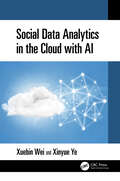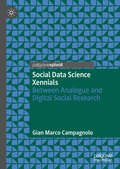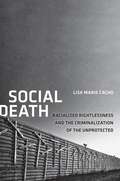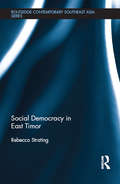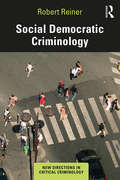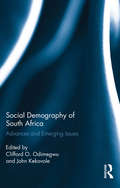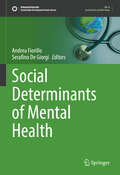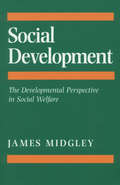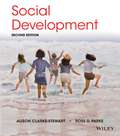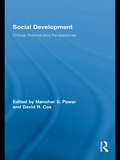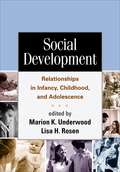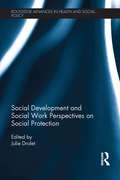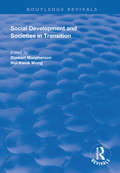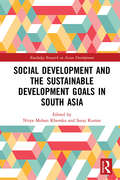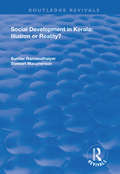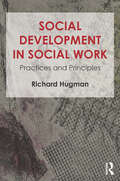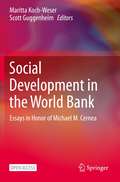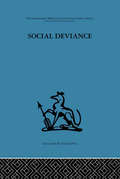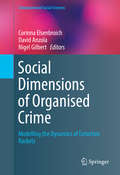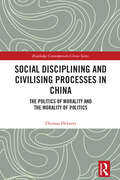- Table View
- List View
Social Data Analytics in the Cloud with AI
by Xuebin Wei Xinyue YeThe rise of cloud computing and Generative artificial intelligence (AI) has revolutionized data analytics pipelines. Analysts can collect, store, and process vast datasets in the cloud with high availability and scalability, and also leverage Generative AI to query and visualize datasets in natural languages. This pioneering textbook provides a gateway for students, educators, and professionals to develop and enhance social data analytics capabilities with the latest cloud computing and AI technologies. The textbook introduces educational cloud resources from leading technology companies, begins with foundational concepts, and progresses to advanced techniques.Features The first textbook on cloud-based social data analytics with the assistance of Generative AI. Introduces educational cloud resources from leading technology companies like AWS, GitHub, and MongoDB. Presents a fully AI-powered data analytics pipeline from Python coding to data collection with APIs, cloud-based data storage, natural language queries, and interactive visualization. Analyzes Census and social media data with the latest large language models (LLMs). Provides hands-on exercises with real-world datasets on timely issues. This textbook is an excellent resource for upper-level undergraduate and graduate students taking GIS, Urban Informatics, Social Science Data Analysis, and Data Science courses; faculty members teaching such courses; and professionals and researchers interested in leveraging cloud computing and Generative AI in social data analytics.
Social Data Science Xennials: Between Analogue and Digital Social Research
by Gian Marco CampagnoloThis book explores the tension between analogue and digital as part of an evolving research programme and focuses on the sequencing of methods within it. The book will be an invaluable reference for scholars who routinely engage in critical sociological analysis of the digital workplace and find it easier to treat the digital as an object of study. It describes how the transformations taking place in the 10-year arc of a career spent doing fieldwork in the IT sector led the author to progressively embrace new forms of data and methods. In a time where sociological imagination takes the shape of whatever new phenomenon can be studied by transactional data and machine learning methods, it is a reminder that longstanding engagement with a particular field of practice is the basis of empirical social science expertise. ‘This short book by Gian Marco Campagnolo is remarkably wide-ranging. It draws on theoretical perspectives as varied as Harold Garfinkel’s ethnomethodology and Andrew Abbott’s ‘linked ecologies’ to discuss topics as diverse as the adoption of packaged enterprise software in the public sector in Italy and the careers of often influential industry analysts. Campagnolo’s methods are primarily qualitative and ethnographic, but he shows a proper appreciation for quantitative methods such as text mining and sequence analysis. The book ends with a discussion of the famously difficult issue of achieving ‘explainability’ in machine learning. Campagnolo tantalisingly suggests the usefulness here of how ethnomethodologists view ‘accountability’: as a practical accomplishment that is hampered, rather than fostered, by efforts to give full explanations.’ —Donald MacKenzie, Professor of Sociology, Edinburgh University, Scotland‘The author adopts a ‘processual’ perspective on social data science as means of exploring and reflecting on the emergence of an academic career within this new domain of interdisciplinary inquiry. This is certainly a novel and interesting approach given the fact that ‘data science’ is work in progress and is characterized by a number of competing occupational groups that are struggling to define this emerging field.’—William Housley, Professor, University of Cardiff, UK‘Having myself written about the relationships between ethnography and computer science, I see this book as a timely contribution in that it extends the existing debate to data science. Data science is an emerging discipline that is gaining central stage in industry and in the public discourse. The aim of this book to indicate the importance of interdisciplinarity in this field is commendable.’—Giolo Fele, Professor, University of Trento, Italy'This book provides two entwined accounts: a reflective personal journey across different projects and methods and a grounded, genealogically sound analysis of the approaches and contributions of social science to understanding the digital society. These dual accounts are adroitly communicated. Their bold combination yields a unique and invaluable contribution to fundamental discussions in the social sciences, as well as an exemplar for how to combine ethnographic and data-driven analysis in a theoretically and epistemologically informed manner. With this book, Campagnolo brings us close to the methods and opens up an inspiring and challenging agenda for combining old and new forms of inquiry into sociological problems.' —Anne Beaulieu, Director Data Research Centre, University of Groningen, Netherlands
Social Death: Racialized Rightlessness and the Criminalization of the Unprotected (Nation of Nations #7)
by Lisa Marie CachoWinner of the 2013 John Hope Franklin Book Prize presented by the American Studies AssociationA necessary read that demonstrates the ways in which certain people are devalued without attention to social contextsSocial Death tackles one of the core paradoxes of social justice struggles and scholarship—that the battle to end oppression shares the moral grammar that structures exploitation and sanctions state violence. Lisa Marie Cacho forcefully argues that the demands for personhood for those who, in the eyes of society, have little value, depend on capitalist and heteropatriarchal measures of worth.With poignant case studies, Cacho illustrates that our very understanding of personhood is premised upon the unchallenged devaluation of criminalized populations of color. Hence, the reliance of rights-based politics on notions of who is and is not a deserving member of society inadvertently replicates the logic that creates and normalizes states of social and literal death. Her understanding of inalienable rights and personhood provides us the much-needed comparative analytical and ethical tools to understand the racialized and nationalized tensions between racial groups. Driven by a radical, relentless critique, Social Death challenges us to imagine a heretofore “unthinkable” politics and ethics that do not rest on neoliberal arguments about worth, but rather emerge from the insurgent experiences of those negated persons who do not live by the norms that determine the productive, patriotic, law abiding, and family-oriented subject.
Social Democracy in Capitalist Society (Routledge Revivals): Working-Class Politics in Britain and Sweden
by Richard ScaseFirst published in 1977. This book considers the nature of industrial society, contemporary capitalism and the impact of political ideas on social structure. These ideas are discussed by reference to the impact of social democracy on the structure of capitalist society in a comparative analysis of Britain and Sweden — including an interview survey of industrial workers socio-political attitudes. The study is concluded by a general discussion of the role of social democracy in capitalist society. It is argued that the development of social democracy generates ‘strains’ which, in the long term, question the legitimacy of capitalism among industrial manual workers.
Social Democracy in East Timor (Routledge Contemporary Southeast Asia Series)
by Rebecca StratingSince the end of the Cold War, considerable scholarly debates have been devoted to the nature and scope of international state-building interventions in ‘fragile’, post-colonial states and their effectiveness in instituting democratic rule. By examining the construction of political institutions in East Timor, this book highlights the relationship between the social and political realms during these processes. Focusing on the roles of East Timorese leaders and civil society organisations during the independence movement, it analyses the effectiveness of democracy building in East Timor. It examines the processes of drafting the new constitution, establishing key political institutions (such as the electoral system), and articulating a new vision of citizenship and social justice. The book argues that East Timor offers a relatively successful case of democratic transition, enabled by a consistent set of goals and aspirations, grassroots political legitimacy and participation, and the development of a democratic civil nation. Offering a coherent argument for why democracy has been successful in East Timor and the roles of political leaders and civil society during democratic transition, this book will be of interest to those studying Southeast Asian Politics, International Politics, and Democracy.
Social Democratic Criminology: Towards A Social Democratic Criminology (New Directions in Critical Criminology)
by Robert ReinerThis book argues that ‘social democratic criminology’ is an important critical perspective which is essential for the analysis of crime and criminal justice and crucial for humane and effective policy. The end of World War II resulted in 30 years of strategies to create a more peaceful international order. In domestic policy, all Western countries followed agendas informed by a social democratic sensibility. Social Democratic Criminology argues that the social democratic consensus has been pulled apart since the late 1960s, by the hegemony of neoliberalism: a resuscitation of nineteenth-century free market economics. There is now a gathering storm of apocalyptic dangers from climate change, pandemics, antibiotic resistance, and other existential threats. This book shows that the neoliberal revolution of the rich pushed aside social democratic values and policies regarding crime and security and replaced them with tougher ‘law and order’ approaches. The initial consequence was a tsunami of crime in all senses. Smarter security techniques did succeed in abating this for a while, but the decade of austerity in the wake of the 2008 financial crisis has seen growing violent and serious crime. Social Democratic Criminology charts the history of social democracy, discusses the variety of conflicting ways in which it has been interpreted, and identifies its core uniting concepts and influence on criminology in the twentieth century. It analyses the decline of social democratic criminology and the sustained intellectual and political attacks it has endured. The concluding chapter looks at the prospects for reviving social democratic criminology, itself dependent on the prospects for a rebirth of the broader social democratic movement. Written in a clear and direct style, this book will appeal to students and scholars of criminology, sociology, cultural studies, politics, history, social policy, and all those interested in social democracy and its importance for society.
Social Demography of South Africa: Advances and Emerging Issues
by Clifford O. Odimegwu John KekovoleThis edited collection investigates what progress has been made in the field of social demography in South Africa since the democratic dispensation in the country. Contributors offer a compilation of in-depth analytical studies of substantive, technical and contemporary issues in the South African demographic landscape. Accessible and topical, it is a useful reference guide to those working in disciplines such as sociology, geography, statistics and economics, and to all those trying to understand the role of national statistical agency in national development planning in Africa. This book project is funded by Statistics South Africa, Pretoria, South Africa.
Social Determinants of Health in Europe: Direct and Indirect Consequences of War
by Adrian BonnerDrawing on the perspectives of women and children displaced from Ukraine, as well as local authority policy makers and service providers, this book provides a unique view of the direct and indirect consequences of war in Europe. Part of the Social Determinants of Health series, this book reviews the socioeconomic challenges faced by the UK and other European countries and suggests ways that these ‘wicked issues’ should be addressed. It is essential reading for local authorities, national governments and humanitarian organisations.
Social Determinants of Mental Health (Sustainable Development Goals Series)
by Andrea Fiorillo Serafino De GiorgiThis book provides a comprehensive exploration of the social determinants of mental health and enhances our understanding of their impact on the development and manifestation of various mental disorders. It offers new insights on the complex interplay between genetic, biological, and social determinants, and highlights the crucial role that social determinants play in shaping the risk and protective factors for mental health. The volume covers factors such as migration, pollution, urbanization, and discrimination that contribute to the development, onset and outcome of major mental health problems, including schizophrenia, major depression, bipolar disorder, and anxiety disorders. Additionally, the book fosters well-being and promotes mental health by emphasizing strategies to fight stigma and discrimination, prevent mental disorders with home-based, school-based, or workplace-based supportive measures. It calls for making mental health accessible to everyone and outlines the importance of addressing social determinants to promote mental well-being.
Social Development: The Developmental Perspective in Social Welfare
by James O. MidgleyThe social development approach seeks to integrate economic and social policies within a dynamic development process in order to achieve social welfare objectives. This first comprehensive textbook on the subject demonstrates that social development offers critically significant insights for the developed as well as the developing world. James Midgley describes the social development approach, traces its origins in developing countries, reviews theoretical issues in the field and analyzes different strategies in social development. By adding the developmental dimension, social development is shown to transcend the dichotomy between the residualist approach, which concentrates on targeting resources to the most needy, and the institutional approach which urges extensive state involvement in welfare.
Social Development
by Ross D. Parke Alison Clarke-StewartSocial Development, 2nd Edition provides psychologists with a comprehensive, scholarly, engaging, and up-to-date treatment of theoretical insights and empirical findings in the field of social development. <P><P>It conveys the excitement of recent advances along with the accumulated knowledge that forms the basis of the field. Psychologists will gain a better understanding of cultural variation, both among societies around the world and within our own society.
Social Development: Critical Themes and Perspectives (Routledge Studies in Development and Society)
by Manohar S. PawarThis edited collection demonstrates that the ideas inherent in social development are practical and not utopian. By discussing and delineating a social development approach, the book argues the need for practicing it at local or grassroots-level communities to promote universal social justice and wellbeing. Towards this end, several leading scholars have presented critical and inspiring thoughts on the significance and usefulness in development of genuine participation of people, bottom-up strategies, self-reliance, capacity building, and egalitarian and empowering partnerships. They also delve into hitherto neglected aspects of social development related to preparing personnel for social development work, ethical imperatives and a new social development paradigm. The world’s contemporary problems persist in part because the social development approach in its comprehensive form has not been planned and implemented at local, national and global levels. Social Development presents the optimistic argument that the application of social development ideas can help create a world in which almost all people’s wellbeing can be significantly enhanced.
Social Development
by Marion Underwood Lisa RosenThis authoritative, engaging text examines the key role of relationships in child and adolescent development, from the earliest infant-caregiver transactions to peer interactions, friendships, and romantic partnerships. Following the sequence of a typical social development course, sections cover foundational developmental science, the self and relationships, social behaviors, contexts for social development, and risk and resilience. Leading experts thoroughly review their respective areas and highlight the most compelling current issues, methods, and research directions. End-of-chapter suggested reading lists direct students and instructors to exemplary primary sources on each topic
Social Development and Social Changes in China: From 1949 to 2019 (Research Series on the Chinese Dream and China’s Development Path)
by Yi ZhangFrom a sociological perspective, this book explores issues related to population mobility, family pensions, and the lives of workers and peasants during the 70 years of urbanization since the founding of New China from the perspectives of population, pension security, employment structure transformation, and social insurance systems, thus exploring the deep logic behind China's successful experience. The relevant issues studied in this book are a systematic summary of the experiences and lessons learned from social reforms since the founding of the country and also provide guidance for the future direction of social development and change.
Social Development and Social Work Perspectives on Social Protection
by Julie L. DroletSocial protection is now considered a development milestone and an important tool in combating poverty. Interventions can include, for example, health insurance, public works programs, guaranteed employment schemes, or cash transfers targeting vulnerable populations groups. This innovative volume is designed to develop understanding about the role and contribution of social protection globally and to share innovative practice and policies from around the world. It explores how to cover an entire population effectively, especially those who are at risk or who are already in a situation of deprivation, and in a sustainable manner. Divided into two parts, the book begins by exploring the theoretical underpinnings of social protection, discussing the social work and social development perspectives and concepts that currently shape it. The second part is comprised of case studies from countries implementing successful social protection initiatives, including Brazil, India, South Africa, Ghana, Nigeria and Indonesia, and reveals how the impact of a successful social protection intervention on poverty, vulnerability and inequality can be dramatic. This volume is an important reference for advanced students and researchers from a range of disciplines including social policy, social work, development studies, geography, planning, economics, sociology, population health and political science.
Social Development and Societies in Transition (Routledge Revivals)
by Stewart MacPherson Hoi-Kwok WongFirst published in 1998, this volume features case studies which reflect the central mission of the ICSW (International Council on Social Welfare) to advance social justice, welfare and development. Contributors including practitioners, policy makers and academics have produced articles rich in reflections on real-life projects and experiences, representing countries at various stages of economic and social development. Issues discussed include poverty alleviation, social development trends in late 20th century Asia, and opportunities and education for women and the disabled, along with international priorities for social welfare and development.
Social Development and the Sustainable Development Goals in South Asia (Routledge Research on Asian Development)
by Nitya Khemka Suraj KumarThis book assesses the roadmap for the implementation of the SDGs in South Asia, focusing in particular on the areas of poverty reduction, inequality, health/well-being and water and sanitation. South Asia is amongst the fastest growing regions in the world, with an aggregate GDP in excess of two trillion US dollars, but at the same time it has significant deficits in human development, with 37 per cent of the world's poor and nearly half of the world's malnourished children. For South Asia, the United Nations' Sustainable Development Goals (SDGs) represent a constructive opportunity to end many of the region's deprivations in a time-bound and systematic manner. Starting with the legacy of the Millennium Development Goals, the book goes on to provide a country-by-country overview of strategies for addressing the problems of poverty, health, water and sanitation. South-South Cooperation and in particular the South Asian Association for Regional Cooperation (SAARC) are discussed and, finally, the editors present a summary of policy priorities for social development. This book aims to be a useful resource for researchers, policy influencers, planners, implementers, students, and activists aiming to push to achieve the SDGs.
Social Development in Kerala: Illusion or Reality?
by Sundar Ramanathaiyer Stewart MacPhersonThis title was first published in 2000: There has been considerable academic interest in the innovative development programme taking place in Kerala, India. Much has been published on the specific "achievements" of the programme, such as literacy, health care, communication and demographic indicators. However, lurking beneath the surface are the harsh realities of chronic unemployment, poverty and deprivation among the elderly and weaker sections of the society, the oppression of women and the inefficiency of the government. These problems are revealed in this book through in-depth empirical research undertaken by a native Keralan. In the light of this material, this text questions whether the Kerala model of development should indeed be regarded as worth emulation.
Social Development in Social Work: Practices and Principles
by Richard HugmanSocial work has always been concerned with the development of society as the basis for achieving the well-being of individuals, families and communities. Interest in this important aspect of social work is now seeing a resurgence, not only in the ‘developing countries’ of the global South, but also in the global North. This innovative book provides an introduction to the area. Using concrete examples taken from practice around the world, Social Development in Social Work address questions such as: How should social development be understood as a core aspect of social work practice? What is the significance of economics, politics and the environment for a developmental approach in social work? How may a comparative understanding of social welfare practices, programs and policies enhance social development in social work? In what ways does social development contribute to international and domestic social work? What skills, knowledge and theory do social workers need to practise in this field? Arguing that social development should be at the centre of contemporary social work practice and theory, this book is ideal for social work students and academics with an interest in social development, international social work, social justice, social policy and community social work.
Social Development in the World Bank: Essays in Honor of Michael M. Cernea
by Maritta Koch-Weser Scott GuggenheimThis open access book honors the work of Michael Cernea, who was the World Bank’s first professional sociologist, by taking on and extending his arguments for "putting people first.” Cernea led a community of social scientists in formulating and promoting a comprehensive set of innovative and original social policies on development issues, which the World Bank adopted and implemented. This book includes globally significant work on urban and rural development, the epistemology of using social science knowledge in national and international development, methodologies for using social organization for more effective poverty reduction, and the experience of crafting social policies to become normative frameworks for purposive collective social action. And by including contributions from senior policy makers in the World Bank who helped shepherd social science's entry into development policy and practice, it provides a unique look at how organizational change can happen.
Social Deviance: Social policy, action and research
by Leslie T WilkinsTavistock Press was established as a co-operative venture between the Tavistock Institute and Routledge & Kegan Paul (RKP) in the 1950s to produce a series of major contributions across the social sciences. This volume is part of a 2001 reissue of a selection of those important works which have since gone out of print, or are difficult to locate. Published by Routledge, 112 volumes in total are being brought together under the name The International Behavioural and Social Sciences Library: Classics from the Tavistock Press. Reproduced here in facsimile, this volume was originally published in 1964 and is available individually. The collection is also available in a number of themed mini-sets of between 5 and 13 volumes, or as a complete collection.
Social Digitalisation: Persistent Transformations Beyond Digital Technology
by Kornelia HahnThis book shows how many previously contingent social processes have gradually been re-organised and transformed into entangled processes of ‘discontinuance’ and ‘continuance’ through the implementation of digital logic. Together with the necessary co-evolution of our collective digital literacy, this persistent process of transformation throughout modernity is theorised here as one of ‘social digitalisation.’ Social digitalisation highlights the ways in which material digital technology, like preceding material technologies, has been fitted into the longer term trajectory of digital transformation. This new social theory thus reverses prevailing accounts of the ‘digital revolution’ that focus exclusively on changes allegedly caused by material digital technology in recent decades. The book also demonstrates the fruitfulness of applying the theory of social digitalisation as a holistic approach in researching the wide-ranging consequences of contemporary digitalisation, including its contrasting effects on different social groups. It will be useful to students and researchers of sociology, communications, media and history, but also for general readers interested in understanding the overall complexity of digitalisation and how digital transformation has come to dominate the ways we live today.
Social Dilemmas: Understanding Human Cooperation (Social Psychology Ser.)
by Samuel S KomoritaEmphasizing real-world examples, Komorita and Parks illustrate both the theoretical and the ecological relevance of social dilemmas, focusing on "exchange theory" to explain how conflicts are resolved. This book is appropriate for students of psychology, political science, and sociology.
Social Dimensions of Organised Crime
by Corinna Elsenbroich David Anzola Nigel GilbertThis book presents a multi-disciplinary investigation into extortion rackets with a particular focus on the structures of criminal organisations and their collapse, societal processes in which extortion rackets strive and fail and the impacts of bottom-up and top-down ways of fighting extortion racketeering. Through integrating a range of disciplines and methods the book provides an extensive case study of empirically based computational social science. It is based on a wealth of qualitative data regarding multiple extortion rackets, such as the Sicilian Mafia, an international money laundering organisation and a predatory extortion case in Germany. Computational methods are used for data analysis, to help in operationalising data for use in agent-based models and to explore structures and dynamics of extortion racketeering through simulations. In addition to textual data sources, stakeholders and experts are extensively involved, providing narratives for analysis and qualitative validation of models. The book presents a systematic application of computational social science methods to the substantive area of extortion racketeering. The reader will gain a deep understanding of extortion rackets, in particular their entrenchment in society and processes supporting and undermining extortion rackets. Also covered are computational social science methods, in particular computationally assisted text analysis and agent-based modelling, and the integration of empirical, theoretical and computational social science.
Social Disciplining and Civilising Processes in China: The Politics of Morality and the Morality of Politics (Routledge Contemporary China Series)
by Thomas HebererThis book argues that a major part of the Chinese government’s road map, formulated in 2017, to modernise China comprehensively by 2049 is the process of social disciplining. It contends that the Chinese state sees that modernisation and modernity encompass not only economic and political–administrative change but are also related to the organisation of society in general and the disciplining of this society and its individuals to create people with “modernised” minds and behaviour; and that, moreover, the Chinese state is aspiring to a modernity with “Chinese characteristics”. The question of modernising by disciplining was extensively dealt with in the twentieth century by leading Western social scientists including Max Weber, Norbert Elias and Michel Foucault, who argued that disciplining, extending from external coercion towards the internalisation of restraints, is indispensable for achieving social order and thereby for “civilisation” –but defined from a European perspective, in relation to developments in Europe. This book therefore not only discusses the Chinese experience of social disciplining, but also, by looking at a non-Western society, identifies universal tendencies of societal change and social disciplining and separates them from particular occurrences.
